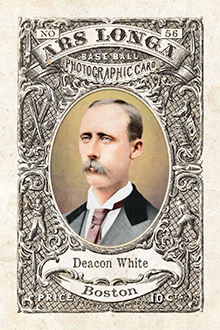- Series: Pioneer Portraits I: 1850-1874
- City: Boston
- Team: Red Stockings (NAPBBP)
- League: National Association (NAPBBP)
- Hall: National Baseball Hall of Fame
James Laurie “Deacon” White (1847-1939). Considered the greatest catcher of baseball’s barehanded period (1870s), White eventually moved to 3rd base, played 23 seasons, won 6 championships, and played with a number of the century’s best players on a number of the century’s best teams.
- 1st person to bat in 1st pro league, in 1871, earning a hit – a double
- Reportedly believed the earth is flat
- 2 batting titles; 3 RBI titles
- Elected to Hall of Fame: 2013
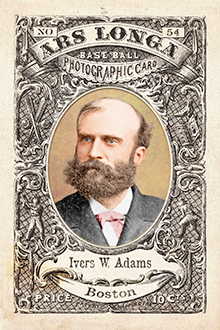
- Series: Pioneer Portraits I: 1850-1874
- City: Boston
- Team: Red Stockings (NAPBBP)
- League: National Association (NABBP)
Ivers Whitney Adams (1838-1914) was a young and ambitious visionary when he first laid eyes on Harry Wright’s new invention: professional baseball. The Cincinnati Red Stockings came to town to trounce the local Lowell lads in a June exhibition on the Boston Commons June 10, 1869. Adams was intrigued and pursued a notion for transforming Boston into a leading post-war metropolis with baseball as an engine of growth. By January 1871, the plans were laid, the Wright brothers were brought on board and the most enduring franchise in professional sports was established -- then the Boston Baseball Association, now the Atlanta Braves.
Ivers was already well on his way to wealth and fame as a patron of Boston’s industrial and social scene. His love of outdoor sports and camaraderie with his up-and-coming peers fit perfectly with the new game about to sweep America. He procured the incorporation, acquired a playing field, set the ticket prices (at Harry Wright’s urging: double the usual fee), and marketed them through George Wright’s sporting-goods emporium. Thus was baseball born in Beantown.
- Adams had vowed to friends that, if he couldn’t recruit the Wrights, he’d abandon the effort to bring the game to Boston. He only wanted the very best.
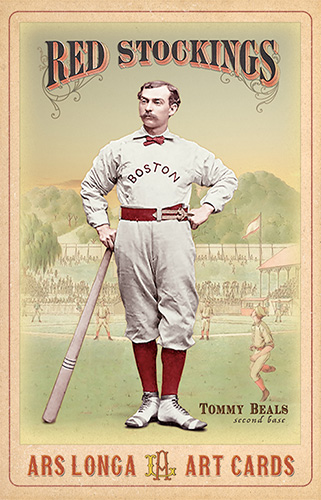
- Series: Beginnings: 1870's
- City: Boston
- Team: Red Stockings (NAPBBP)
- League: National Association (NAPBBP)
Thomas Lamb Beals (1850-1915) played for four early major league teams, getting into 123 games in six seasons over the first decade of big league ball. He began in Washington D.C. with the Olympics of the NABBP in 1871. He batted .194 in 10 games, which was about a third of the schedule.. He came back the following year and hit .306 playing in all nine games. His manager with the Olympics was Nick Young, one of the founders of the game. He followed Young to the new D.C. club, the Blue Stockings, in ‘73. Beals was a regular that year and hit a respectable .276. He had played under the name W. Thomas in Washington. When he moved to the powerful Boston Red Stockings in 1874 he assumed his given name. He was only a part-timer in Boston for two seasons. When the National Association gave way to the new National League in ‘76 Tommy found himself out of work. He got one more chance with the White Stockings in 1880, getting into 13 games. His poor .152 average sent him into retirement.
- During his hiatus from the majors Beals had played briefly in the Bay Area for the SF Mutuals and the Oakland Pioneers in the California League
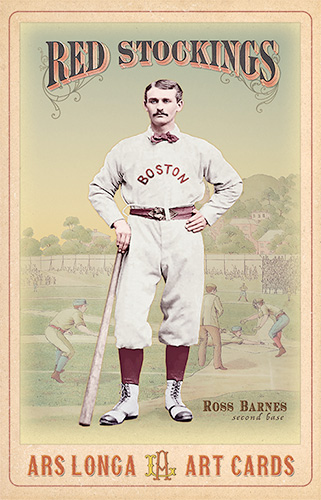
- Series: Beginnings: 1870's
- City: Boston
- Team: Red Stockings (NAPBBP)
- League: National Association (NAPBBP)
Charles Roscoe Barnes (1850-1915) was the best player in the five year history of the fist professional baseball league, the National Association of Professional Baseball Players (NAPBBP), 1871-1875. Barnes is the all-time NAPBBP leader in runs, hits, doubles, walks, stolen bases, total bases, batting average, OBP and SLG%. He then dominated the National League in its inaugural year, 1876, leading the league hits, runs, average, OBP, SLG%, total bases, doubles, triples and walks. He also hit the 1st HR in National League history, for the Chicago White Stockings, 5.2.1876. Over the first six years of his major league career, Barnes' batting average was .397. An unidentified illness limited Barnes to just 22 games in 1877, and he was never the same player again, retiring shortly thereafter at the age of 31.
“Roscoe C. Barnes…was the greatest second baseman the game ever had…” - A History of the Boston Baseball Club, 1897.
"No matter how great you were once upon a time — the years go by, and men forget. Ross Barnes, forty years ago, was as great as Cobb or Wagner ever dared to be. Had scores been kept then as now, he would have seemed incomparably marvelous.” - W.A. Phelan, Baseball Magazine, 1915
- Because he played in the second game in MLB history, is credited with the 17 other players that day as the 27th player to debut in MLB
- 1st hitter to win batting titles in 2 leagues: NA in ’72-73 and NL in ‘76
- In 1918, made Cap Anson’s all-time team as the shortstop
- Barnes was selected as SABR’s ”Overlooked 19th Century Baseball Legend “ for 2013
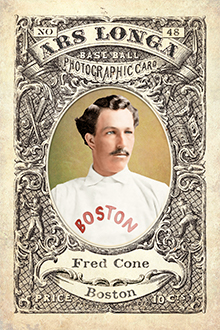
- Series: Pioneer Portraits I: 1850-1874
- City: Boston
- Team: Red Stockings (NAPBBP)
- League: National Association (NAPBBP)
Joseph Frederick Cone (1848-1909) played professionally for the Boston Red Stockings of the old National Association in 1871 and, at age 30, one season with the minor-league New Bedford/New Haven/Hartford club in the International Association. The Bostons were among the elite of their day with George and Harry Wright, and a young Al Spalding on the mound. In his latter stint, Fred played with many who would go on to major-league careers of note. Among them: Billy Barnie, Roger Connor, Jim Mutrie, and Harry Stovey. Such was the opportunity that lay before young ballplayers of that era. The game was rapidly establishing itself in the nation’s consciousness. History was being made and traditions were being formed.
- Cone batted .260 in his major-league campaign. In between his time in Boston and Connecticut, Fred was an umpire for two seasons: 1875 in the NA and 1877 in the NL
- Played amateur ball for the Rockford Forest Citys in 1868-69 before following teammates Spalding and Ross Barnes to Boston
- Rockford may have been the first to pay players, at least for their “practice” time
